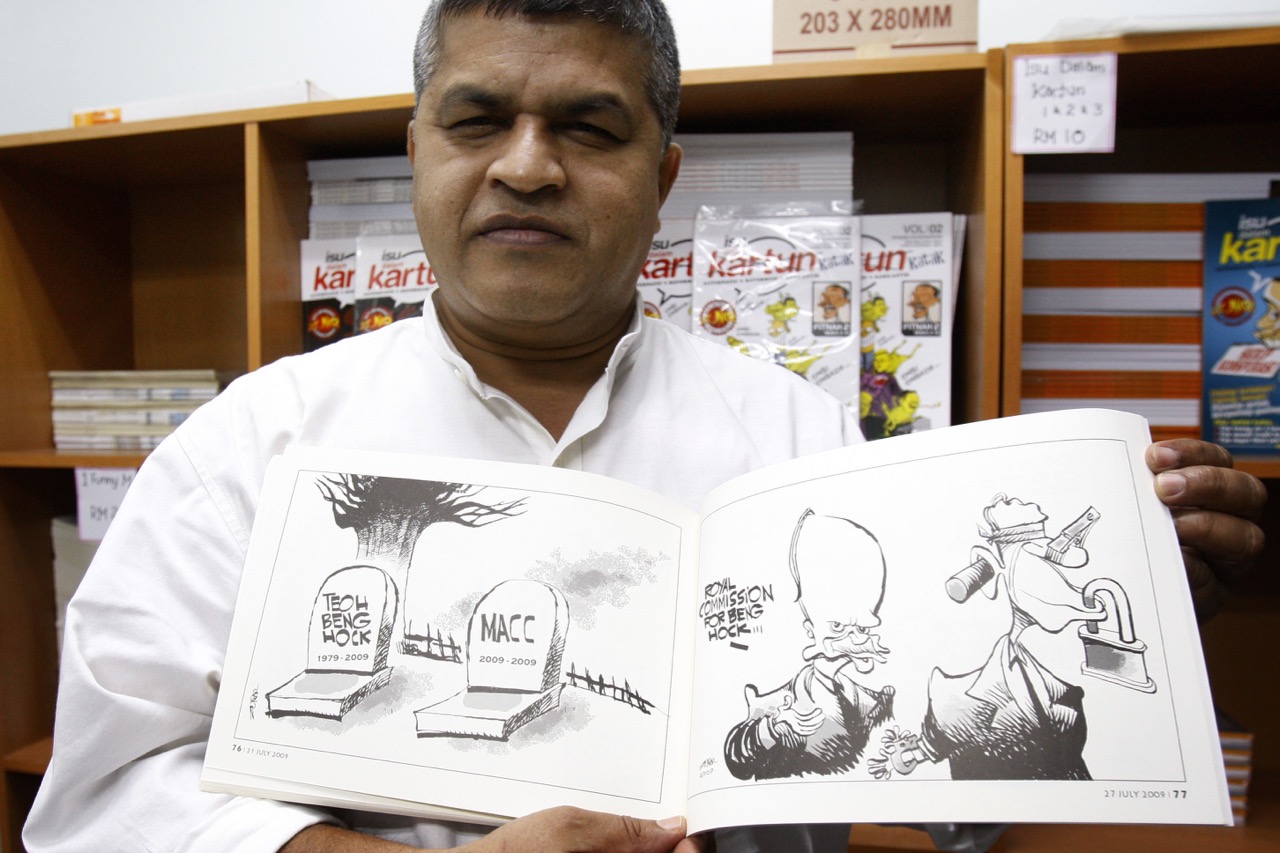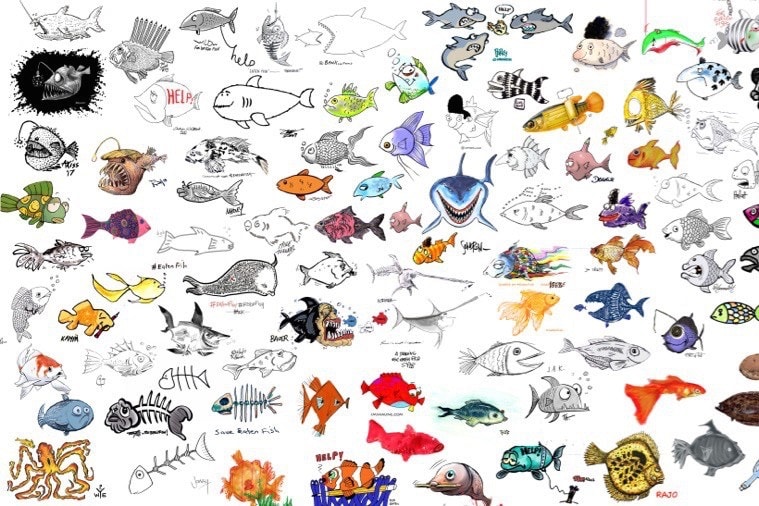Imprisonment or homelessness in Papua New Guinea, an unfair trial in Turkey and endless court battles in Malaysia. For these three renowned artists, challenging power has turned cartooning into a very perilous profession.
This statement was originally published on cartoonistsrights.org on 3 July 2017.
EATEN FISH
Manus Island made headlines again in June 2017 when the Australian government settled a class action lawsuit with detainees to the tune of $90 million (Australian). Despite the appearance of progress we understand this news was greeted with despair in the centre and is interpreted as an attempt by the Australian government to wash its hands of the entire affair. The camp is set to close in a matter of months and those who have no official status as a refugee, of which our latest Courage in Editorial Cartooning Award winner Eaten Fish is one, face homelessness at best and imprisonment in Papua New Guinea at worst. The detainees continue to be subjected to violence at the hands of locals. As ever the reporting of Behrouz Boochani from within the centre has been invaluable for all monitoring the final days of this shameful chapter in Australia’s history, industrial scale human rights violation in an era when the plight of displaced people should be at the forefront of everyone’s minds.
In that spirit the Herne Bay Cartoon Festival will pay tribute in August, exhibiting the shoal of cartoon fish created by contributors from around the world as an expression of solidarity. Our UK colleagues the Professional Cartoonists’ Organisation have continued to lead the way in this effort, constantly reminding Australian ministers of their obligations.
MUSA KART
Musa’s trial is set to begin in three weeks’ time. The recent experience of reknowned writers Ahmet and Mehmet Altan is potentially instructive. After a week of hearings on charges similar to Musa’s their next court appearance will not be until mid-September. As can be seen in the item below, forestalling or protraction of legal procedures is in itself a tactic employed by oppressive regimes as longer battles consume time, money and energy on behalf of the defendants and, in many cases, amount to imprisonment without due process of law.
Meanwhile our letter to President Jean-Claude Juncker in May elicited a response from his office at the European Commission:
“We share your concern about the rights of journalists in Turkey and continue to encourage Turkey to respect its obligations as a member of the Council of Europe and as a candidate country of the European Union. The European Union continues to closely monitor the human rights situation in Turkey and the measures taken by the Turkish government since the coup attempt in July 2016. In our continuous dialogue with the Turkish authorities, we stress the centrality of Turkey complying with its obligations in the area of human rights and fundamental freedoms. We have repeatedly encouraged Turkey to address the concerns of the Council of Europe and to ensure the right to a fair trial and the presumption of innocence. As the European Commission noted in its 2016 Report on Turkey, legislation and practice in the area of freedom of expression do not comply with European Court of Human Rights (ECtHR) case-law. The selective and arbitrary application of the law has a negative impact on freedom of expression in Turkey.”
ZUNAR
Zunar has been unable to leave Malaysia for over a year. He reports today [July 3] that a new judge has been assigned to his appeal against the travel ban, moving his opportunity for a fair hearing to late September.
Update, July 5th
In a defiant mood, Zunar has made the following statement after Monday’s [July 3] delay to his appeal against his long-standing travel ban and a further court decision yesterday [July 4] pertaining to a similar case:
“[The] Malaysian Court of Appeal today ruled that the right of Malaysian citizens to travel overseas is at the absolute discretion of the government. In delivering a decision on another activist (Tony Pua), the judges said the issue of [granting] passports to citizens to travel abroad is a privilege accorded by the government.
Freedom of movement is a fundamental right for all citizens of Malaysia as stated clearly in Article 5 (1), Article 8 and Article 9 of the Federal Constitution. ‘Fundamental’ is a hard fact, it is not open to interpretation. It is also stated in The Universal Declaration of Human Rights by the United Nations. I do not know why judges choose grey when black and white is right in front of them.
I am not allowed to travel overseas now, after the travel ban imposed on me since June 2016. The Malaysian government imposed the travel ban immediately after I received the Cartooning for Peace Award 2016 which was presented by Kofi Annan in Geneva. My challenge will be heard by the High Court on 25 September 2017. It will be difficult for me because in normal practice, the High Court will follow the decision by the Court of Appeal. Nevertheless, I will keep fighting, fighting and fighting to get back my right to freedom of movement.”
The freedom and safety of all three cartoonists must be restored and we urge the governments of Australia, Turkey and Malaysia to do so.

Eaten Fish

Malaysian cartoonist Zunar holds a copy of his comic book that was banned by the Malaysian Home Ministry in Kuala Lumpur, 25 June 2010AP Photo/Lai Seng Sin



